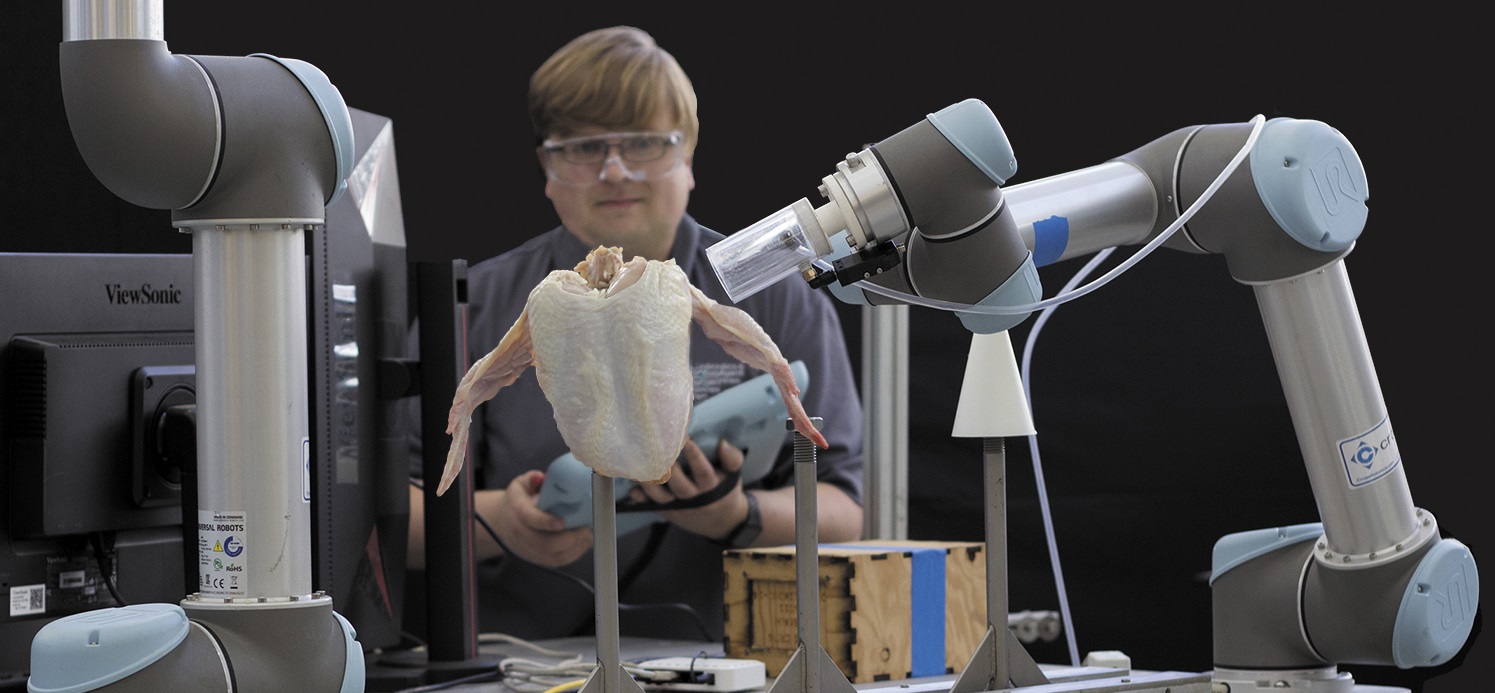
Robotics engineer Konrad Ahlin has been named the R. Harold and Patsy Harrison Research Faculty Fellow in Poultry Technologies at the Georgia Tech Research Institute’s (GTRI) Agricultural Technology Research Program (ATRP).
The fellowship, made possible through an endowment from the R. Harold and Patsy Harrison Foundation, recognizes innovative, promising early-career research faculty interested in exploring breakthrough applied engineering and science research to address poultry industry challenges. Ahlin is the first recipient of the newly established three-year fellowship.
Ahlin, who earned a Ph.D. in robotics from the Georgia Institute of Technology (Georgia Tech) and joined GTRI in 2018 as a research engineer II, will focus his research efforts on enabling robots to handle uncertain and unpredictable objects like poultry products with the same reliability and repeatability as human operators.
An expert in robotics, controls, and path planning, Ahlin aims to figure out exactly how to identify, grasp, and manipulate products from the birds coming into the poultry plant to the chicken nuggets going out. Successful implementation of more advanced robotics in the industry will not only increase production efficiencies but will also alleviate some of the labor concerns of manual operations while ultimately giving a boost to food security.
“It is truly an honor to be recognized in this way. Thank you to the R. Harold and Patsy Harrison Foundation, GTRI, and ATRP for this opportunity. I’m looking forward to tackling the poultry robotics challenge,” said Ahlin.
Established in 1973, ATRP develops advanced technology in support of Georgia’s multibillion-dollar poultry industry, the state’s leading agricultural sector. The technologies help poultry processors optimize operations and improve efficiency, safety, product yields, and environmental sustainability.
The R. Harold and Patsy Harrison Foundation was founded by the Harrisons’ daughter, Bobbie Ann Harrison Reynolds, and her husband, Raymond H. Reynolds, Jr. (a Georgia Tech industrial engineering alumnus), in honor of her late parents with a primary goal to strengthen and support education. Her father founded Harrison Poultry in 1958 in Bethlehem, Georgia.
“The entire ATRP team is grateful to the R. Harold and Patsy Harrison Foundation for the confidence they’ve placed in us and their generosity in helping us continue our decades-long mission of bringing cutting-edge R&D to Georgia agribusiness, especially our great partners in the poultry sector,” said Doug Britton, ATRP program manager.
Contact: Angela Colar, 404.407.8825, angela.colar@gtri.gatech.edu
Georgia Tech Research Institute (GTRI) is the nonprofit, applied research division of the Georgia Institute of Technology (Georgia Tech). Founded in 1934 as the Engineering Experiment Station, GTRI has grown to more than 2,700 employees supporting eight laboratories in over 20 locations around the country and performs more than $600 million of problem-solving research annually for government and industry. GTRI's renowned researchers combine science, engineering, economics, policy, and technical expertise to solve complex problems for the U.S. federal government, state, and industry. Learn more at https://www.gtri.gatech.edu/ and follow us on LinkedIn, Twitter, Facebook, and Instagram.





